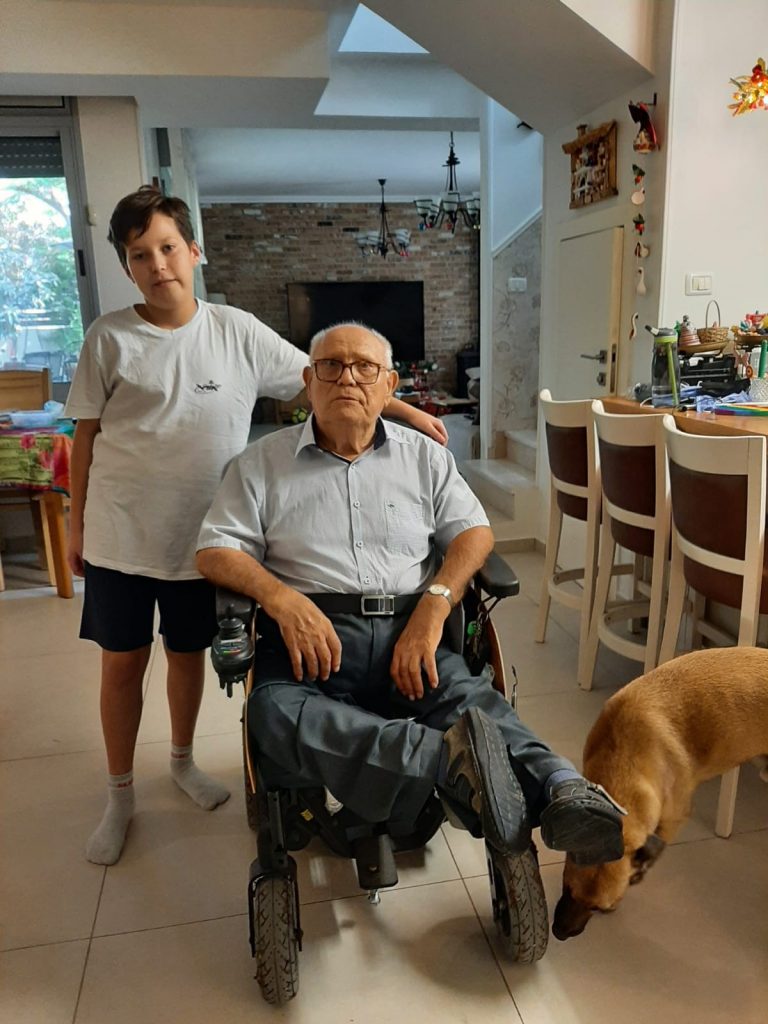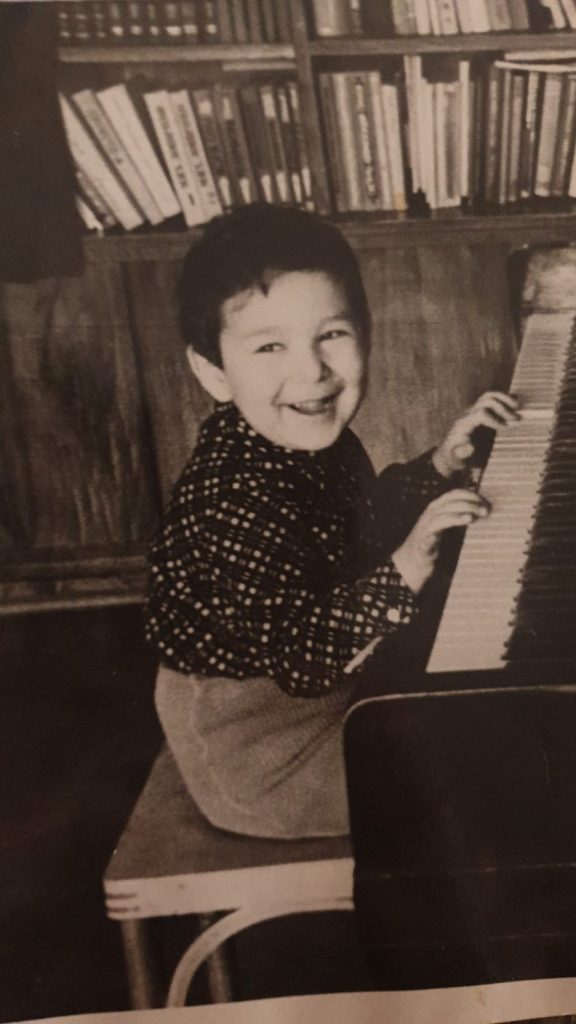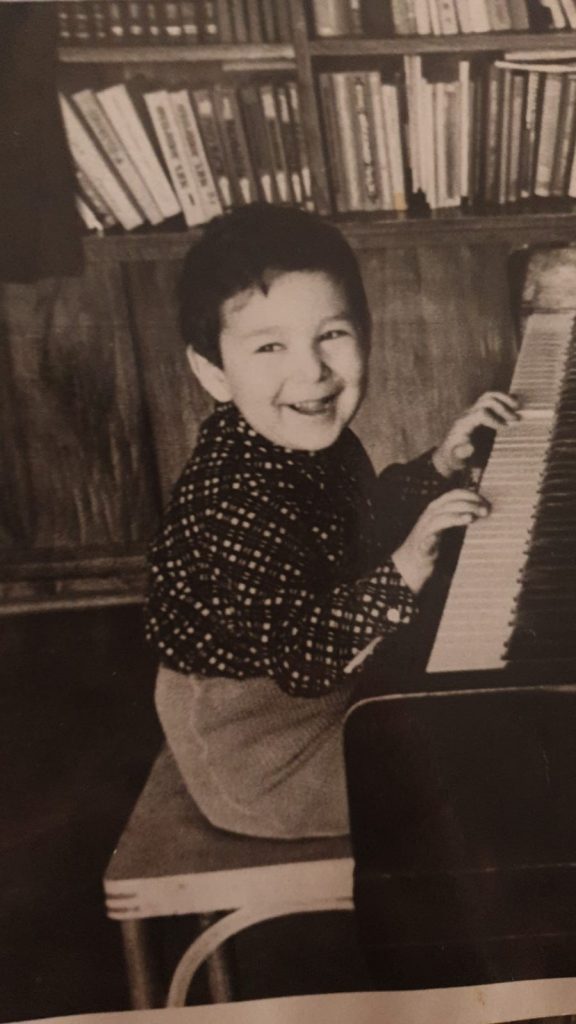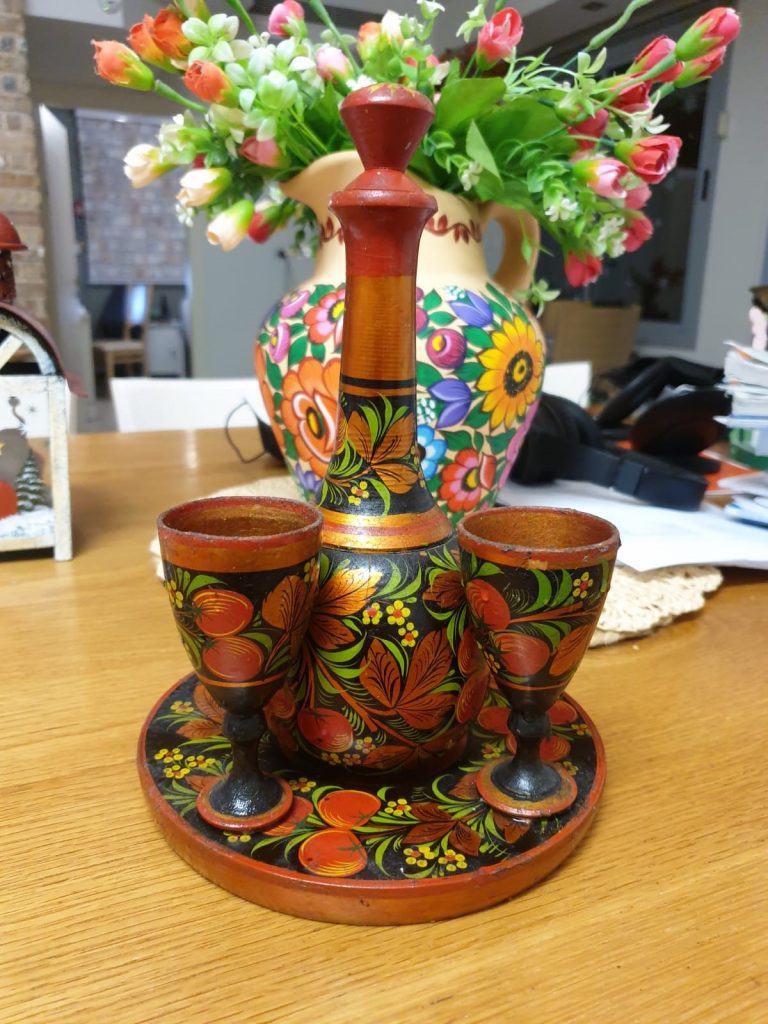גם סבא אייזיק שלי היה תלמיד בבית ספר


Description of the Picture
´ 1. In the picture I can see my grandfather, Aizik Kriksfeld, when he was 5 years old. This picture was taken in 1946 in Moldova after the end of World War
2. When the war ended my grandfather, and his family went back to their home which they had to leave when my grandfather was a small baby. In this picture we can see my grandfather sitting next to the piano at his house with a big smile on his face J He loved very much to play the piano!
´ I chose this picture because it’s the only picture of my grandfather as a child.
My grandfather at the age of five- סבא בן חמש
My grandfather’s favorite dis
My grandfather's favourite dish is Borscht soup. As a child he used to eat the soup with his family every Friday night, after lighting the Shabbat candles. The person who used to cook the Borscht was his mother. In the past there was no large supermarket in town, so most of the ingredients were grown in the garden or bought from the neighbours.
The most important ingredient is beets, which are why the soup gets its very special red color.
The soup has a very strong and great smell, and it tastes very special: it’s sour and sweet at the same time. It comes from Eastern-Europe and includes ingredients that were available.
My grandfather, who immigrated to Israel from Moldova, loves to eat this soup because the memory of the Shabbat table, with the Borsch soup on it, reminds him of his childhood with his big family there. Friday night was the only moment of the week when the whole family sat together, so it means a lot to him. For this reason, he is always very excited when he eats Borscht, and he even taught my mother how to cook it to pass the recipe in our family.
This picture was taking from the site www.dreamstime.com
Grandpa’s traditional item
The item that my grandfather kept in his house since he moved to Israel in 1976, 46 years ago, is a collection of wooden items called Khokhloma. The Khokhloma is a Russian hand painted item made of wood, that is very popular among the nations of the former Soviet Union. This area has a lot of forests, so many wooden products are produced there, and the Khokhloma is one of them. Khokhloma is usually painted in dominant colors such as red, black, and gold.
My grandfather lived and grew up in Moldova before he moved to Israel, and this traditional item was very popular in his area. Although the Khokhloma is a kitchen product, people don’t eat and drink with it – it’s produced to be a home decor item. When he moved to Israel, my grandfather, Aizik, decided to bring the Khokhloma with him because it reminds him of the house where he grew up, as child, with his parents and all his brothers, so the Khokhloma isn’t only very beautiful but also very meaningful to him!
Interview with mygrandfather, Aizik Kriksfeld
I lived in Moldova, a former part of the USSR, in a small town named Rîșcani. Many Jewish families lived in this town. My father was a tailor, and my mother was a housewife who raised me and my four siblings.
The work at home was difficult: basic products such as butter, cheese and bread had to be made at home as well. In addition, we had a lot of animals that needed to be taken care of: we needed to milk the cow, feed the animals, and collect the eggs from the chickens.
I helped my mother a lot and even went out to work at a young age to support the family because my father passed away when I was 8 years old.
At the young age I played with my friends in nature. We loved playing ball games and we had a river that we really enjoyed swimming in and fishing.
The language we spoke at home was only Yiddish, while the language we spoke with the non-Jewish locals was Russian. Today I still speak both
languages fluently. It’s very important to remember these languages because they are a very central part of the culture that characterizes me. As a Jew who grew up in Eastern Europe, a key characteristic is knowledge of the Yiddish language. However, since not everyone was Jewish, it was very important to speak the local language, which in my case was Russian.
My childhood was different because in the past we always played outside and didn’t stay at home. Our games were very simple. We played with materials that found outside. In addition, children always used to respect their parents and help them with household chores, and work in order to support the family financially. Furthermore, we couldn’t go to the supermarket and buy our food. We had to produce it ourselves. Despite of the difficulties, I remember my childhood as a pleasant and good one!”.
My Grandfather’s School Years
My grandfather studied at the same school in the town of Rîșcani, USSR, (Moldova today) from the first grade to tenth grade. The studies in the Soviet Union lasted 10 years. After graduating, my grandfather received a matriculation certificate.
An ordinary school day started at 8:00 a.m. and lasted until 3:00 p.m. The subjects my grandfather studied from first to fifth grade were: writing and reading in Russian, mathematics and sports. From sixth grade he also studied Russian literature, mathematics, chemistry, physics, history, sports and a foreign language – German.
My grandfather wore a school uniform which included: dark blue pants and a white button-down shirt. On top of the shirt, he had to wear a blue jacket.
In addition, he had to arrive on time, otherwise he wouldn’t be allowed to enter school. Those who were absent had to bring a document from a doctor (this was the only reason that was acceptable for absence from school). There was very strict discipline and a complete silence during classes. When the teacher entered the classroom all the students stood up, and only after the teacher approved, they could sit down.
The teachers used a blackboard and wrote in white chalk. Doing homework was compulsory! The teachers would write the grade of “2” (failed) to those who didn’t do their homework (the grades in the USSR were between 1 and 5). Each student had a notebook that was intended for writing homework, and it was mandatory for the parents to sign each grade.
My grandfather’s favorite teacher was the physics teacher, who taught him from sixth grade to tenth grade. She was a teacher with a sense of humor and taught him in a very interesting way by showing a lot of experiments at the lab. He felt that his teacher greatly appreciated him.
There are some similarities, but quite a few differences, between my grandfather's school and my school. First of all, I went to elementary school and only then started high school. In contrast, my grandfather studied in the same school until he graduated. In addition, my grandfather studied for 10 years while I study for 12 years according to the law in Israel. Furthermore, the foreign language my grandfather learned was German while here the foreign language I learn is English. Lastly, at my grandfather's school there was more reverence for the teachers, and I think that the teachers in my school are respected on a certain level, but not in the same way.
In addition to the differences between the schools, there are some similarities: At my grandfather's school the students were also obligated to wear the school uniform. Secondly, my school also teaches subjects such as mathematics, physics, local language studies and sports. In conclusion, I think that there are more differences than similarities between my school and my grandfather's school. There are quite a few things that are better about his school, but there are some things that I’m glad are not the same, such as studying German instead of English, an international language that is very useful everywhere for communication.
Grandfather’s
הזוית האישית
איתי: נהניתי מאוד ללמוד על החיים של סבא שלי ובעיקר על השנים שבהן היה תלמיד בבית הספר. אהבתי מאוד להיפגש עם סבא ולשמוע ממנו סיפורים מאוד מעניינים.
מילון
אידישYiddish - this is the language of the Jewish people in east Europe אידיש - שפה יהודית שבה נהגו לדבר היהודים במזרח אירופה.
ציטוטים
”Despite of the difficulties, I remember my childhood as a pleasant and good one“







